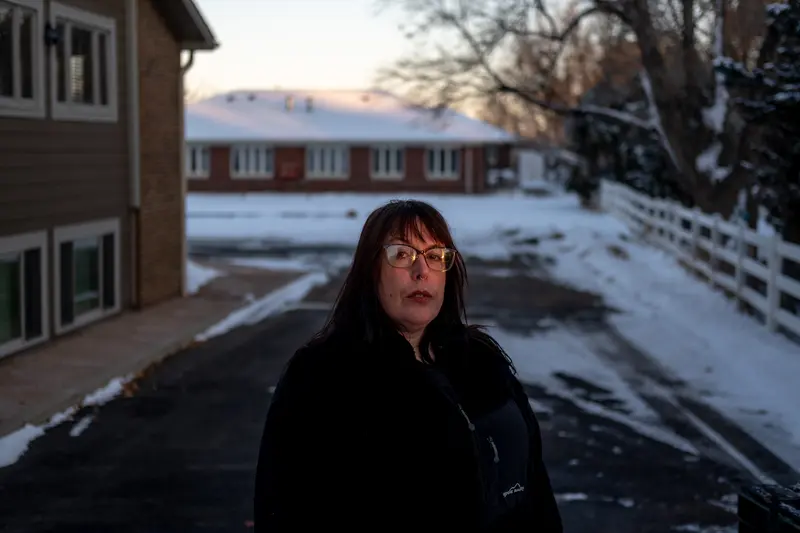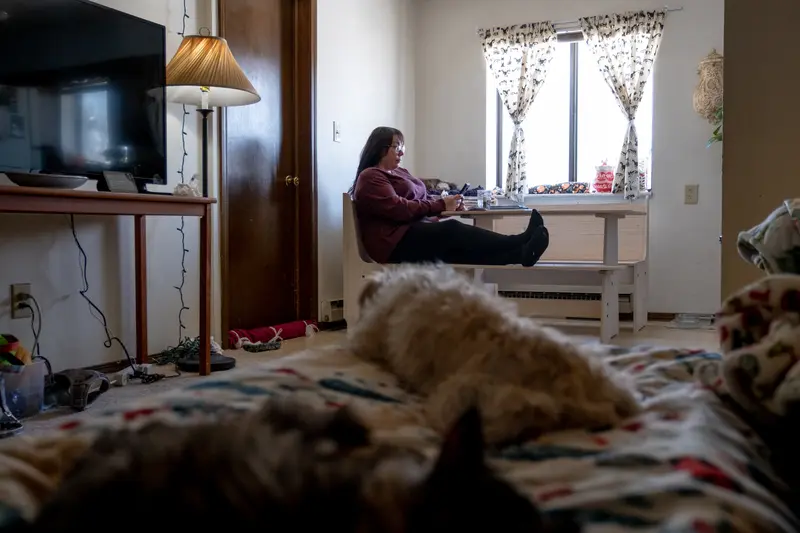Soon after Shannon Lucas began serving a sentence at a Colorado halfway house, her medication began to disappear.
Lucas had been sentenced to eight years in community corrections in lieu of prison for her role in a 2018 burglary involving her ex-boyfriend. At 41, she had never been in trouble with the law before.
“I did believe that I was in a place that was for justice,” she said of her first weeks at the Larimer County Community Corrections facility in Fort Collins in October 2018. “I really thought going in there that I was going to be protected.”
That would change less than a month later when she reported the theft of her prescription medications, which treat her post-traumatic stress disorder and severe anxiety. Instead of help, she got a lesson in how little recourse residents of these facilities have to address wrongdoing in the system.
Lucas filed a complaint with management, which, instead of investigating, wrote her up for “medication misconduct.”
Her lawyer requested security footage from the facility that might show who’d taken the pills. A judge ordered that it be given to the attorney on the condition that it not be released to anyone else.

Tim Hand, the facility’s director, and Emily Humphrey, director of Larimer County’s criminal justice department, did not respond to requests for comment.
Halfway houses hold residents’ medications and provide doses under supervision. And the Larimer County Community Corrections facility had a documented problem with tracking medications, according to state records.
A 2016 audit found that 1 in 4 of the medication counts that auditors reviewed were inaccurate and that staff were not “consistently following policy and procedures” to address inaccuracies. Auditors said corrective action was needed. A 2019 audit found that the facility did not have procedures for disposing of medications. State auditors have not reviewed the facility’s medication practices since.
When residents of Colorado’s halfway houses believe they are victims of wrongdoing, they are often left with few options for restitution in a system that lacks a streamlined, independent complaint process and does little to allay their fears of retaliation.
Each facility is required to have a grievance policy, but dozens of residents from multiple halfway houses told ProPublica that they didn’t use it because they feared staff would retaliate. Even residents who’d graduated from a program said they were reluctant to criticize their old facility because their parole officer could send them back there. A person can be expelled from a program for “any reason or for no reason at all,” a 2012 law says. People who get expelled are typically incarcerated or resentenced.
A 2017 audit of a different Colorado facility, ComCor, found that formal complaints were not “consistently maintained, reviewed or responded to.” Clients said they believed complaints “simply wound up in the trash,” auditors wrote.
Mark Wester, the executive director of ComCor, said that the facility allows “clients to work in the community, be productive citizens, receive client centered treatment, while having accountability and supervision that improves community safety.” Wester did not respond to a request for comment about the handling of complaints.

The state has the power to investigate residents’ complaints but it rarely does, according to Katie Ruske, manager of the state’s Office of Community Corrections. Complaints submitted to the state are forwarded to one of the local community corrections boards, which ProPublica found often look past violations or fail to follow up to see if problems are addressed.
Ruske, who has held her job since 2018, could recall only one such investigation, which involved an alleged violation of the Americans with Disabilities Act. Starting in 2023, the state will review client complaints as part of its audits.
At the Larimer County Community Corrections facility, Lucas noticed in late October 2018 that more pills had disappeared. Lucas asked the staff member on duty to count them: 24 pills were missing.
In a panic, Lucas submitted a second complaint to staff and called 911. Lucas said she needed documentation to replace the medication before she went into withdrawal. “I can have seizures, I can die if I don’t take my medication,” Lucas said.

A Larimer County Sheriff’s Office incident report indicates that Lucas spoke to Officer Aaron Hawks, who suspected she was taking more than the prescribed amount of her medication. (An internal affairs investigation would later find that the officer violated policies, including failing to maintain an “impartial attitude” toward Lucas by calling her “a felon” and referring to community corrections staff as “vetted.” The report states he did not gather the evidence that would be necessary to conclude Lucas was at fault.) The Larimer County Sheriff’s Office did not respond to a request for comment.
The facility responded by issuing Lucas a Class 1 violation — the most serious — for submitting a “false” police report. Such violations can result in termination from a program, according to the facility’s guidebook.
“If I am revoked from this program, I am going immediately to prison” for eight years, Lucas said. “I was so scared I wasn’t going to be able to see my daughters.”
Lucas appealed to management, who quickly denied her complaint. She wrote another appeal and met with the facility’s assistant director, who told her that she too believed Lucas was responsible for the missing medication, Lucas said. Lucas was then required to attend an administrative hearing with management to determine if she would be terminated from the program. Her request to have a lawyer present was denied.
She was ultimately allowed to remain in the program, but her sentence was extended by a month, according to court documents.

Under the direction of her doctor, she began receiving weekly prescriptions instead of monthly so she could keep a closer eye on her medication. But pills continued to disappear.
In March 2019, she gave her new prescription to a staff member, Lauren Hand. Lucas recalls the correctional services specialist telling her, “Shannon, there’s two pills missing but I’m not gonna say anything.”
A month after Lucas left the facility in April 2019, Lauren Hand was charged with two misdemeanors and a petty offense for unlawful possession of a controlled substance, official misconduct and theft. She resigned shortly after, according to an incident report.
By then, Lucas had graduated from the residential program and moved home to complete her sentence with frequent check-ins at the facility.
Lauren Hand, who is the daughter of the facility’s director, Tim Hand, did not respond to requests for comment.
The outcome of the charges against Lauren Hand is unclear because the documentation is not public. According to Raymond Daniel, records manager for the district attorney’s office in the 8th Judicial District, the case would still appear in public records even if the charges were dropped. However, if the case was sealed or expunged, the public would not be able to view the records, he said in an email.
Hand worked at another halfway house in Boulder before accepting a position at a youth detention center operated by the state’s Division of Youth Services in October 2021, according to her LinkedIn profile. As of January 2022, she no longer worked there, according to a spokesperson for the agency.
Lucas filed a lawsuit over her stolen medication against Lauren Hand and other staff members at the Larimer County Community Corrections facility, as well as the board of county commissioners and the local community corrections board. Lucas alleged that staff at the facility retaliated against her for reporting the missing medication to police.
The judge dismissed the case in July 2022, saying, among other things, that Lucas’ allegations were overly broad. Lucas has filed an appeal.
Though Lucas is back at home with her daughters, she is required to report to the facility for drug tests, sometimes multiple times a week, and for meetings with her case manager. She said it’s a struggle to enter the facility without having a panic attack.
Employees at the halfway house emphasize the importance of taking responsibility for one’s actions, she said, but staff aren’t always held to that standard.
“They still say that I was stealing my medication,” Lucas said. “They literally could have just done the right thing. They could have just listened to me.”











